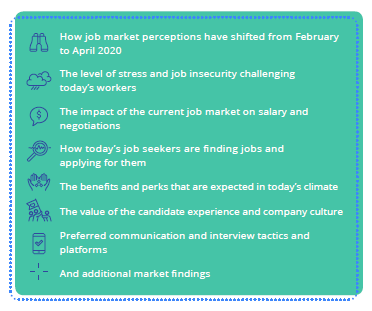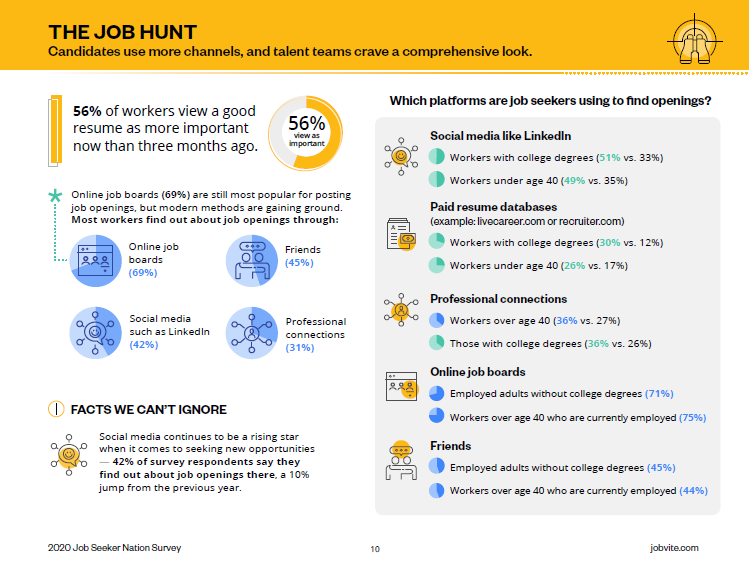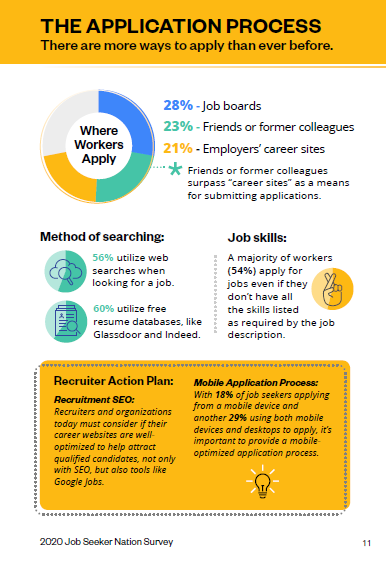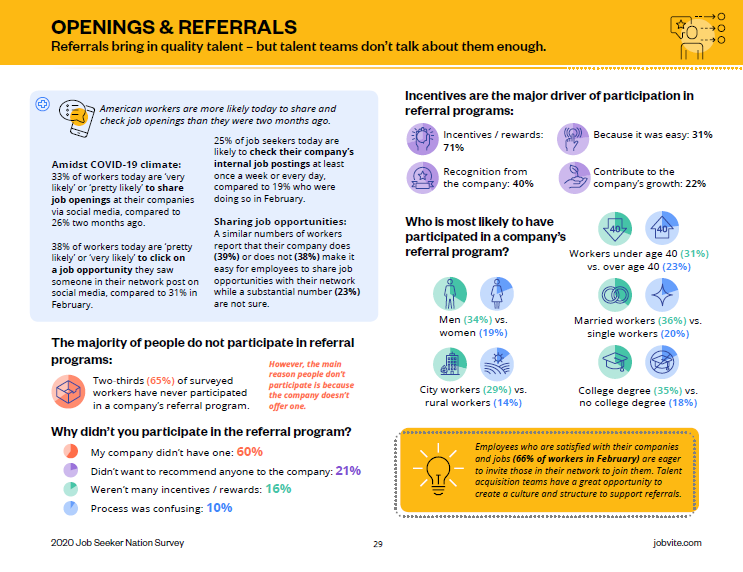Title:2020 Job Seeker Nation: Before & During COVID-19
Author:Hannah Morgan
Date:May 2020
Source:Career Sherpa - Reprinted with permission
Jobvite's 2020 Job Seeker Nation study was just released and here are the highlights to help you understand how job seekers find jobs during COVID-19 (and before COVID-19) and apply for them.
There's a reason I love sharing Jobvite's Job Seeker Nation report. It helps you understand what your competition is doing. I hope you use this data to help develop a new job search strategy or alter what you are doing.
The 2020 Job Seeker Nation Report has two data sets. Pre-COVID-19 (February 2020) and Early COVID-19 (April 2020).
The first survey of 1,515 workers (part time, full time and unemployed) was conducted in February 2020. The second survey was run in April 2020.
The job market has drastically changed in just a few short months. But it doesn't mean companies have stopped hiring. They may have slowed down in some industries or sectors, but there are many companies who are ramping up their staff.
Check out the who's hiring resources listed here.
Selected Highlights From Jobvite's Study
- 73% of respondents believe finding a job this year is harder, compared to 48% who felt this way just two months ago
- 54% of respondents are concerned about losing a job, compared to 30% two months ago.
- Most workers find out about job openings through online job boards, friends, social media (LinkedIn), professional connections
- 33% of workers today are likely to share job openings at their companies via social media, compared to 26% two months ago
- Nearly half of workers are planning to have a second source of income outside of their 9-5 jobs
- 81% of workers think company culture is important in their decision to apply for a job
Here's the full table of contents from Jobvite's 2020 Job Seeker Nation Report:

Let's take a look at what's going on in the minds of job seekers.
Where Job Seekers Find Jobs
Job seekers hear or learn about jobs through a variety of sources.
The secret to your job search success is to diversify how and where you are looking for opportunities. And while it isn't specifically mentioned in this report, there is a hidden job market comprised of jobs that aren't publicly advertised.
Social media continues to be a rising star when it comes to seeking new opportunities
— 42% of survey respondents say they find out about job openings there, a 10% jump
from the previous year.
Jobvite 2020 Job Seeker Nation
Online job boards (69%) are still most popular for posting job openings, but modern methods are gaining ground.
- 31% Professional connections
- 42% Social media such as LinkedIn
- 45% Friends
- 69% Online job boards
Take note, this is just how job seekers "learn about" or find jobs.

How Job Seekers Apply For Jobs
Once a job has been uncovered, job seekers take different steps to submit their application.
- 28% — Job boards
- 23% — Friends or former colleagues
- 21% — Employers' career sites
A majority of workers (54%) apply for jobs even if they don't have all the skills listed as required by the job description.

Employee Referral Programs
65% of surveyed workers have never participated in a company's referral program. In all fairness, 60% worked for a company that didn't have a program.
Pre-COVID-19 65% of workers never or rarely check their company's internal postings. Employees said they prefer to learn about jobs these ways:
- Their manager (37%)
- Company's internal communication system (26%)
- Personal communication from HR (22%)
However, during April at the beginning of COVID-19 there was an up swing in employees activity with internal jobs.
- 25% of job seekers today are likely to check their company's internal job postings at least once a week or every day, compared to 19% who were doing so in February.
- 33% of workers today are 'very likely' or 'pretty likely' to share job openings at their companies via social media, compared to 26% two months ago.
- 38% of workers today are 'pretty likely' or 'very likely' to click on a job opportunity they saw someone in their network post on social media, compared to 31% in February.

Perks Job Seekers Look For
Job seekers were interested in jobs that offered remote work options even before COVID-19.
65% of job seekers say remote work is 'very important' or 'somewhat important' in
their decision to accept a job offer.
Jobvite 2020 Job Seeker Nation
There was a small drop in job seekers' expectation to receive healthcare during the April survey. This surprises me. I would think now, more than ever, healthcare would be a key criteria when evaluating job opportunities.
- Expect Healthcare benefits: 64% in April vs. 67% in February
Preferred Interview Formats
It's clear that job seekers prefer in-person interviews, even during COVID-19 (though that's not realistic).
- In-person interviews: (77%)
- Videos: (45%)
- Phone calls: (67%)
- Email: (32%)
- Text Messaging: (31%)
Job Seekers Welcome Texting
Employers are using text messages to communicate with job seekers. This has been a growing trend and one job seekers seem to appreciate.
- 60% of workers who received a text message after applying for a job preferred this type of communication over email or phone call.
- And 42% of candidates are open to receiving text messages from recruiters.
Negotiate, Everyone Else Is
Negotiating a job offer is your best chance for getting what you want. If you don't try to negotiate, someone else will. Don't miss out.
- 61% of respondents are "very" or "somewhat" comfortable negotiating.
Salaries Seem To Be Rising
One of the main reason's job seekers look for a new job is to get paid more. Pre-COVID-19, this seemed to be working at least some of the time.
Over one-quarter (27%) of workers say the initial salary offer from their current
or most recent job was slightly or significantly more than expected compared to
21% in 2019 and 17% in 2018.
Jobvite 2020 Job Seeker Nation
Workers Still Need More Money
Now and before COVID-19, job seekers said they need more money.
- 46% of workers surveyed in April say they plan to have a second source of income outside of their regular 9-5 jobs, compared to 36% in February. (The top reason...56% said a need for more money.)
- The number of workers doing freelance work for extra income increased
to 51% (up 13%) from last year's 38%.
Do you have extra sources of income? Consider starting a side business or "passion project" you can turn on or off based on your financial needs.
Company Culture Matters
While compensation is important, but company culture is too. Ranking second in April's survey, a company's values and culture was an important factor in evaluating a job offer. 52% of job seeker's listed this as important in April compared to 38% February.
Leaving Within First 90 Days
The hiring process (from posting the job through onboarding new employees) needs your attention. You don't want to be going through this again too soon. To help you understand why employees left their job during the first 90 days, make sure you have all your questions answered.
Here are the top 3 reasons employees left within the first 90 days:
- Day-to-day role not what was expected: 46%
- Incident or bad experience: 39%
- Company Culture: 35%

